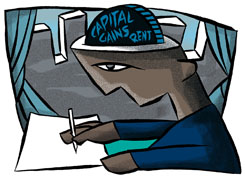Ramalingam Kalirajan |8442 Answers |Ask -Follow
Mutual Funds, Financial Planning Expert - Answered on May 09, 2024
He has an MBA in finance from the University of Madras and is a certified financial planner.
He is the director and chief financial planner at Holistic Investment, a Chennai-based firm that offers financial planning and wealth management advice.... more

Hi, iam 47 years male, my monthly income is approx 1.5 lakhs but somehow i got into a financial crunch from last 4 years due to job problems & monthly expenses have risen to above 3.5 lac due to home, car, personal loan, credit card dues etc & i'am unable to bear it all. Is there any financial institution from where i get a loan of say 40 lacs & clear all my dues & than pay 1 emi against this amount.
Given your income and existing liabilities, securing a loan of 40 lakhs may be challenging without collateral. However, you could consider options such as a loan against property (LAP) or a personal loan with a higher amount, provided you meet the lender's eligibility criteria.
Loan against property offers larger loan amounts with longer repayment tenures, leveraging the value of your property as security. On the other hand, a personal loan typically comes with shorter tenures and higher interest rates but may be more accessible without collateral.
Approaching financial institutions like banks or non-banking financial companies (NBFCs) that specialize in debt consolidation loans could be beneficial. They'll assess your financial profile, including your income, liabilities, and credit history, to determine your eligibility and the loan amount you qualify for.
Once approved, consolidating your debts into a single loan can simplify your repayment process, replacing multiple EMIs with a single, manageable installment. This could potentially lower your overall interest burden and provide breathing space to stabilize your finances.
However, it's essential to weigh the pros and cons carefully and ensure that the terms of the new loan align with your long-term financial goals. Seeking guidance from a Certified Financial Planner can help you navigate this process effectively, ensuring a strategic approach to debt management and financial planning.
Remember, addressing financial challenges requires patience and proactive steps. By taking control of your finances and seeking the right support, you can gradually work towards achieving stability and financial well-being.
Best Regards,
K. Ramalingam, MBA, CFP,
Chief Financial Planner,
www.holisticinvestment.in
You may like to see similar questions and answers below
Ramalingam Kalirajan |8442 Answers |Ask -Follow
Mutual Funds, Financial Planning Expert - Answered on Jun 23, 2024
Ramalingam Kalirajan |8442 Answers |Ask -Follow
Mutual Funds, Financial Planning Expert - Answered on Mar 13, 2025
Ramalingam Kalirajan |8442 Answers |Ask -Follow
Mutual Funds, Financial Planning Expert - Answered on May 15, 2025
Dr Nagarajan J S K |401 Answers |Ask -Follow
NEET, Medical, Pharmacy Careers - Answered on May 15, 2025
Dr Nagarajan J S K |401 Answers |Ask -Follow
NEET, Medical, Pharmacy Careers - Answered on May 15, 2025
Dr Nagarajan J S K |401 Answers |Ask -Follow
NEET, Medical, Pharmacy Careers - Answered on May 15, 2025
Dr Nagarajan J S K |401 Answers |Ask -Follow
NEET, Medical, Pharmacy Careers - Answered on May 15, 2025
Dr Nagarajan J S K |401 Answers |Ask -Follow
NEET, Medical, Pharmacy Careers - Answered on May 15, 2025
Dr Nagarajan J S K |401 Answers |Ask -Follow
NEET, Medical, Pharmacy Careers - Answered on May 15, 2025
Vipul Bhavsar |83 Answers |Ask -Follow
Tax Expert - Answered on May 15, 2025
Vipul Bhavsar |83 Answers |Ask -Follow
Tax Expert - Answered on May 15, 2025
Vipul Bhavsar |83 Answers |Ask -Follow
Tax Expert - Answered on May 15, 2025
Vipul Bhavsar |83 Answers |Ask -Follow
Tax Expert - Answered on May 15, 2025






















